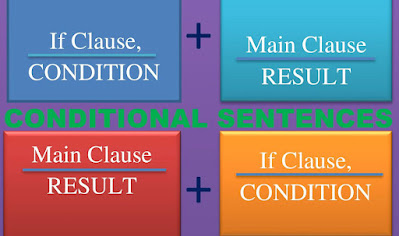LESSON PLAN OF CONDITIONAL SENTENCES Subject English Grade 10th
LESSON NO. 25-CONDITIONAL SENTENCES
Subject English
Grade 10th
- Conditional sentences are used to express that the action in the main clause can only take place if a certain condition is fulfilled. Conditionals describe the result of a certain condition. Conditionals have two clauses: if clause and Main clause. The if-clause tell us the condition (if you study hard) and the main-clause tells us the result (you will pass your exams).
TYPES OF CONDITIONAL SENTENCES:
- There are four types of conditionals:
i. Zero Conditionals
ii. Conditionals Type 1
iii. Conditionals Type 2
iv. Conditionals Type 3
i. Zero Conditionals:
- Zero conditionals are used to talk about things that are generally true, especially for laws and rules, as such;
i. When/if I drink too much coffee, I can`t sleep at night.
ii. Ice melts when/if you hot it.
iii. When the sun goes down, it gets dark.
iv. My mother becomes anxious if I get home late.
Sentence Structure is:
If/When Main-Clause
Present simple Present simple
- The order of the clauses does n`t change the meaning;
i. If you are honest, all is safe.
ii. If you go out in the rain, you can get wet.
iii. If wealth is lost, nothing is lost.
iv. If you heat ice, it melts.
v. Ice melts if you do heat it.
vi. When you heat ice, it melts.
vii. Ice melts when you do heat it.
viii. If it rains, the grass gets wet.
ix. The grass gets wet if it rains.
x. When it rains. The grass gets wet
xi. The grass gets wet when it rains.
ii. Conditionals: Type 1
- This type of conditionals tells us that something will happen if a certain condition is fulfilled. The condition may or may not be fulfilled. It generally tells about the future situations that we think are real or possible, as such;
i. If it does n`t rain tomorrow, we’ll go to the beach.
ii. Peshawar Gladiators will be top of the league if they win.
iii. When I finish work, I’ll call you.
Sentence Structure is:
If/Clause Main-Clause
Present simple Future- simple
i. If you work hard you will get good marks.
ii. If you play well you will win the match.
iii. If you pay attention you will understand easily.
iv. If they don`t obey their parents they will get nothing.
v. What will happen if I don`t do this?
3. Conditionals: Type 2
- Conditionals of this type are used to express the situation that is not likely to happen or that is impossible. In this type we talk about something that we don`t expect to happen or which is purely imaginative.
i. If we had a garden, we could have a cat.
ii. If I won a lot of money, I’d buy a big house in the country.
iii. I would n`t worry if I were you.
Sentence Structure is:
If-clause Main-clause
Past simple would+1st form of verb
i. If you told mother I would beat you.(which I expect you will not tell mother)
ii. If I bought a bike I would give you a ride.
iii. She would get offended if you did not fulfill her desire.
iv. They would win the match if they played well.
v. You would get good marks if you worked hard.
vi. If I were you, I would n`t mention it.
vii. If she was prime minister, she would invest more money in schools.
viii. He would travel more if he was younger.
4. Conditionals: Type 3
- Conditionals of this type say that something didn`t happen because a certain condition was not fulfilled.
i. If I`d studied harder at school, I would have gone to university. (He didn`t study very hard and he didn`t go to university.)
ii. We would n`t have got lost if you had n`t given me the wrong directions. (They weren`t given the correct directions and they didn`t find their way.)
iii. She might have finished the exam if she`d had more time. (She didn`t finish the exam and she didn`t have more time.)
Sentence Structure is:
If-clause Main-clause
Past Perfect Would have + 3rd form of verb
Might have + 3rd form of verb
Could have + 3rd form of verb
i. She would have completed her task if she had more time.
ii. If I had my car I would have learnt how to drive.
iii. They would have won the match if they had played well.
iv. They would not have found me if you had not told them.
v. If you had worked hard you would have got good marks.
vi. If you had come to me I might have helped you.
vii. If he had learnt how to drive a car he could have driven it.









Comments
Post a Comment